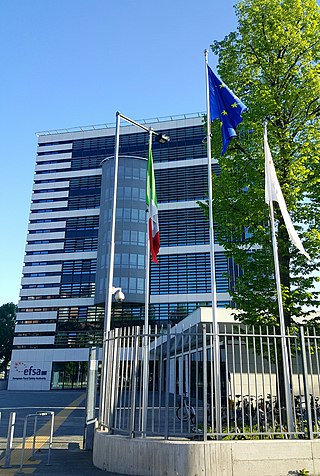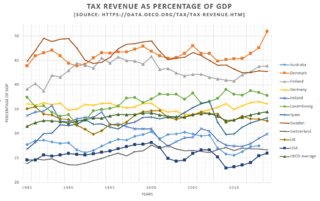
The Office of Price Administration (OPA) was established within the Office for Emergency Management of the United States government by Executive Order 8875 on August 28, 1941. The functions of the OPA were originally to control money and rents after the outbreak of World War II.
Regulation is the management of complex systems according to a set of rules and trends. In systems theory, these types of rules exist in various fields of biology and society, but the term has slightly different meanings according to context. For example:
Food quality is a concept often based on the organoleptic characteristics and nutritional value of food. Producers reducing potential pathogens and other hazards through food safety practices is another important factor in gauging standards. A food's origin, and even its branding, can play a role in how consumers perceive the quality of products.

The government agencies in Sweden are state-controlled organizations that act independently to carry out the policies of the Government of Sweden. The ministries are relatively small and merely policy-making organizations, allowed to monitor the agencies and preparing decision and policy papers for the government as a collective body to decide upon.

Raw milk or unpasteurized milk is milk that has not undergone pasteurization, a process of heating liquid foods to kill pathogens for safe consumption and extension of shelf life.

Bulk confectionery, pick and mix candy,candy walls, or simply loose candy is a retailing strategy where various types of confectionery are sold together in a large container or in separate bins, allowing customers to select the assortment and quantity they prefer. Typically used in vending machines or confectionery retailers, this method involves dispensing candy by weight or piece count. This method has a global presence, with variations in practice and terminology across regions.

The Cabinet Office (CAO) is an agency of the Cabinet of Japan. It is responsible for handling the day-to-day affairs of the Cabinet.
Food and Drug Administration, Maharashtra State, is Maharashtra's primary instrument of consumer protection. It is a law enforcement agency. In 1970, the Government of Maharashtra entrusted the responsibility of enforcement of the Prevention of Food Adulteration Act, 1954 to FDA which is when it got its present name.
A regulatory agency or independent agency is a government authority that is responsible for exercising autonomous jurisdiction over some area of human activity in a licensing and regulating capacity.

The European Food Safety Authority (EFSA) is the agency of the European Union (EU) that provides independent scientific advice and communicates on existing and emerging risks associated with the food chain. EFSA was established in February 2002, is based in Parma, Italy, and for 2021 it has a budget of €118.6 million, and a total staff of 542.
A food safety agency or food administration or Food Safety Authority is a government agency responsible for ensuring the safety, quality, and proper labeling of food products within a country or region. These agencies play a crucial role in protecting public health by establishing and enforcing regulations and standards to ensure that food produced, imported, processed, distributed, and sold is safe for consumption.

Food safety is used as a scientific method/discipline describing handling, preparation, and storage of food in ways that prevent foodborne illness. The occurrence of two or more cases of a similar illness resulting from the ingestion of a common food is known as a food-borne disease outbreak. This includes a number of routines that should be followed to avoid potential health hazards. In this way, food safety often overlaps with food defense to prevent harm to consumers. The tracks within this line of thought are safety between industry and the market and then between the market and the consumer. In considering industry-to-market practices, food safety considerations include the origins of food including the practices relating to food labeling, food hygiene, food additives and pesticide residues, as well as policies on biotechnology and food and guidelines for the management of governmental import and export inspection and certification systems for foods. In considering market-to-consumer practices, the usual thought is that food ought to be safe in the market and the concern is safe delivery and preparation of the food for the consumer. Food safety, nutrition and food security are closely related. Unhealthy food creates a cycle of disease and malnutrition that affects infants and adults as well.

The Ministry of Finance is a Swedish government ministry responsible for matters relating to economic policy, the central government budget, taxes, banking, security and insurance, international economic work, central, regional and local government.

Food safety in China is a widespread concern for the country's agricultural industry and consumers. China's principal crops are rice, corn, wheat, soybeans, and cotton in addition to apples and other fruits and vegetables. China's principal livestock products include pork, beef, dairy, and eggs. The Chinese government oversees agricultural production as well as the manufacture of food packaging, containers, chemical additives, drug production, and business regulation. In recent years, the Chinese government attempted to consolidate food safety regulation with the creation of the State Food and Drug Administration of China in 2003; officials have also been under increasing public and international pressure to solve food safety problems. Chinese Vice Premier Li Keqiang said, "Food is essential, and safety should be a top priority. Food safety is closely related to people's lives and health and economic development and social harmony," at a State Council meeting in Beijing.

Taxation in Sweden on salaries for an employee involves contributing to three different levels of government: the municipality, the county council, and the central government. Social security contributions are paid to finance the social security system.

The Ministry of Agriculture and Rural Development is a department of the Albanian Government in charge of regulation of the economic activity in the agricultural sector of the country with a purpose of increasing the sector's production capacity.
The Ministry for Development of Economy and Trade is the main authority in the system of central government of Ukraine responsible for formation and realization of state economic and social development policies ; regulation of consumer prices; industrial, investment and trade economic policies; development of entrepreneurship; technical regulation and security of consumer rights; inter-agency coordination of economic and social cooperation of Ukraine with the European Union. In 2019-2020 it also encompassed functions of the Ministry of Agrarian Policy and Food.

The Spanish Agency for Food Safety and Nutrition (AESAN) is a regulatory agency of the Government of Spain responsible for promoting food safety and for providing guarantees and objective information to consumers and economic agents of the Spanish agrifood industry.










